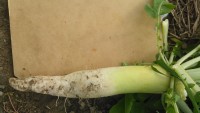Event Details
Date
October 13, 2016
Time
10:30am -2:00pm
Location
Stanton's Feura Farm
210 Onesquethaw Creek Road
Feura Bush, NY 12067
Cost
$5.00
(additional attendee $5.00 ea.)
(additional attendee $5.00 ea.)
Host
Cornell Vegetable ProgramEVENT HAS PASSED
Cover Crop Field Demonstration Day
October 13, 2016
With the increasing interest in using cover crops, we would like to invite you to learn from expert cover crop researchers including Dr. Paul Salon, Northeast Soil Health Specialist, USDA-NRCS Soil Health Division at Big Flats Plant Materials Center and Dave Wilson, Research Agronomist and Cover Crop Specialists, formerly with King's Agriseeds. Paul and Dave will provide an overview of the cover crops selected for this demonstration and how species selection was determined. Come and see over 20 different species or combinations planted no-till into standing sweet corn at 3 different planting dates. In addition our hosts will demonstrate their Unverferth Ripper Stripper unit and discuss their reduced tillage and cover crop experiences systems used for vegetables.
Tentative Agenda:
10:30 Registration and check-in
11:00 Introductions
11:05 Overview of cover crops and reasons for selection
11:50 Lunch
12:30 Travel to cover crop plots
12:45 Unverferth Ripper Stripper demonstration
1:00 Tour the plots
2:00 Adjourn
Cover Crop Demo: Not What Grandpa Used to Plant (PDF; 3179KB)



































